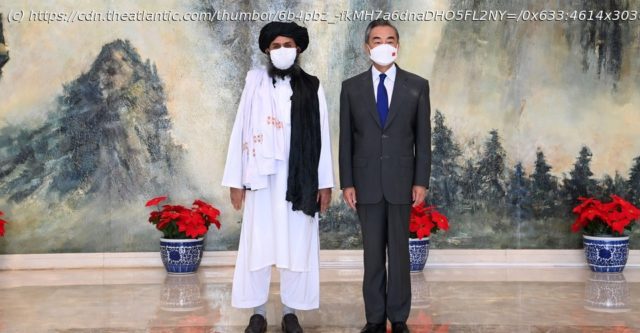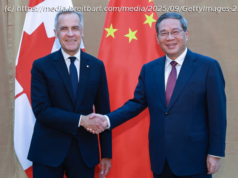Beijing’s policies now that the Taliban is in charge will provide clues as to how it views global leadership.
F or those of us wondering what kind of superpower China might be, we’ll soon get some clues in, of all places, Afghanistan. In the aftermath of the American departure, how Beijing handles relations with Kabul—whether it can forge economic ties with the Taliban, how much political and diplomatic sway it seeks, and, most crucial, if it can use its leverage to influence the new regime—could offer a window into how it might wield its newfound power in other global-security crises, especially in the absence of a strong American presence. Why China would want to wade into an Afghan morass may at first seem bewildering. To a certain extent, it has little choice, with the mess perched precariously on its western border and the Americans no longer around to do the job of maintaining security. But the U.S. withdrawal also presents Beijing’s leaders with an opportunity: to solidify their dominance in a region they consider their backyard and, even more, to play the role of hero by succeeding where Washington failed. It’s a big unknown, however, whether China can, or will, aggressively seek to fill the void left by the United States. Doing so will force Beijing to get its hands dirtier than it usually prefers. Generally speaking, Chinese leaders have avoided the urge to intervene in global-security issues and regional disputes. (In certain respects, China has been a source of instability, with its territorial claims in the South China Sea and persistent support of toxic regimes such as North Korea, Iran, and Venezuela.) Instead, Beijing tends not to take sides and attempts to do business with everyone. Beijing has left political problem-solving to Washington and its allies, while Chinese companies (typically with ties to the government) go around building highways and selling telecom networks. Except now in Afghanistan, they’ll need to step out onto the tightrope without the American safety net to catch them. Afghanistan “is a sort of early test case” for how China will handle “a specific group of countries that the U.S. has been so deeply absorbed with over the past couple of decades,” Andrew Small, a senior fellow at the German Marshall Fund of the United States, a policy think tank, told me. “There is this question of what China’s approach is actually able to deliver.” Beijing’s Afghan policy will also be something more, though: a test of its entire worldview, and the specific form of international relations it has created. Beijing and Washington have the same basic concern about Afghanistan—that it will again become an international threat—but China’s leaders see the problem in an entirely different way. The Chinese often deride America’s penchant for foreign interventions (though in the case of Afghanistan, they derived some benefit from it), and Washington’s promotion of democratic ideals through its foreign policy. China’s leaders advocate the principle of “noninterference” in other countries’ affairs. That translates to a diplomatic order stripped of its values (or at least those of the liberal variety). While Americans try to make other societies more like America’s, the Chinese don’t much care what kind of government another country has, or what it might be doing to its own people, as long as it’s not causing trouble for China. The Chinese viewpoint—leaving foreign peoples under brutal regimes to their fate—may seem callous. Yet the strategy has a degree of pragmatism. The Chinese simply deal with other governments as they are, not how they wish them to be.






